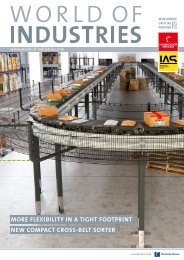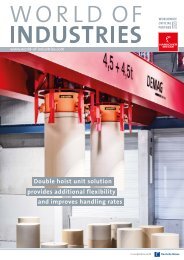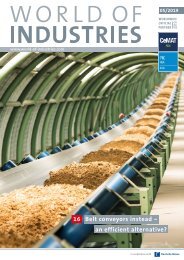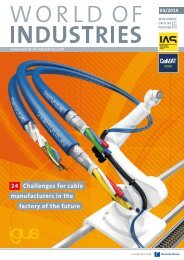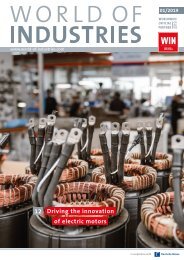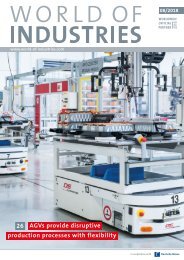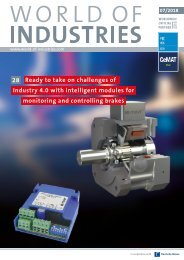MDA Technologies 3/2016
MDA Technologies 3/2016
MDA Technologies 3/2016
- TAGS
- mda
- technologies
Create successful ePaper yourself
Turn your PDF publications into a flip-book with our unique Google optimized e-Paper software.
could put British production sites at risk. The German auto industry<br />
alone has 100 production sites in Britain including suppliers. If there<br />
were a trade conflict between Britain and the European Union, the<br />
damage would be enormous. It would be a serious setback for the<br />
industry and would surely result in some production sites relocating.<br />
What are Britain’s alternatives to<br />
continue trade with the EU?<br />
As an EU member, UK companies are able to trade with the EU on a<br />
tariff free and quota free basis. By deciding to leave the EU, first of all<br />
Britain will have to negotiate new trade deals with EU. During these<br />
negotiations for a new trade deal, there is nothing to stop Brussels<br />
seeking to impose a higher tariff on all UK exports coming into the<br />
EU. The UK can, of course, threaten tit-for-tat tariffs on EU made<br />
products say for example German automobiles and components,<br />
but it means consumers on both sides suffer. There is also the risk<br />
that the EU will impose quotas, which limit the amount of goods<br />
and services that can be sold into Europe.<br />
With Britain’s withdrawal from full membership of the EU, there<br />
would be a number of potential options for managing its trading<br />
relationships:<br />
n Membership of the European Economic Area like Norway<br />
n A customs union, similar to the one the EU has with Turkey<br />
n A bunch of bilateral agreements like the ones between Switzerland<br />
and the EU<br />
n A free trade agreement such as the ones EU has with countries like<br />
South Korea and South Africa<br />
n Trade with the EU under WTO rules<br />
1. The Norway option: If Britain joined the European Economic<br />
Area (EEA), British firms would have access to EU’s single market<br />
and would continue to benefit from its trade deals with other countries.<br />
But Britain would have no say over EU’s trade policy, and it<br />
would still have to abide by EU regulations while enjoying very little<br />
input into the drafting of those regulations. In fact, the UK could<br />
face increasing regulatory costs and administrative costs due to lack<br />
of representation.<br />
2. The Turkey option: A customs union of the kind that Turkey<br />
has with the EU, this arrangement is not really a ‘union’, as tariffs are<br />
decided by Brussels. Here as well, the UK would have no input into<br />
EU trade policy but would have to comply with it. And British-based<br />
manufacturers would have to comply with EU product standards<br />
and regulations anyways.<br />
3. Swiss-style: A relationship based on bilateral negotiations and<br />
agreements would be inherently more palatable for the British.<br />
Switzerland’s relationship with the EU rests on a series of bilateral<br />
sectoral agreements. Switzerland has free trade in goods, but it has<br />
no agreement with the EU on services. Swiss access is limited to<br />
those parts of the EU services market for which they have brokered<br />
sectoral agreements with the EU. The UK’s financial services industry<br />
would face a serious challenge as its Swiss counterpart; The UK<br />
would be free to negotiate bilateral trade agreements with non-EU<br />
countries, but these could prove less of a benefit than they appear.<br />
4. A free trade agreement: The UK could leave the EU and sign a<br />
free trade agreement with it. There is a good chance that the tariffs<br />
levied by the EU on British manufactured goods would be zero.<br />
However, the deeper the trade agreement, the more EU regulation<br />
the UK would have to abide by. British manufacturers would certainly<br />
have to continue to comply with EU product standards and<br />
technical specifications in order to sell their goods to other EU<br />
countries. But at best that would only give Britain the same level of<br />
access that it currently enjoys.<br />
5. Trade with the EU under WTO rule: The UK would not have to<br />
comply with EU regulations, but it would face the EU’s Common<br />
External Tariff (CET). For example, food imports are subject to an<br />
average EU tariff of 15 %, while car imports face a 10 % tariff, and car<br />
Concerns about Brexit<br />
SHORT-TERM CONCERNS:<br />
n Slump in sales,<br />
n Increase in costs due to tariffs,<br />
n Increased time from factory to market<br />
due to heavy regulations and certifications,<br />
n Withdrawal of companies and investments<br />
n Years of negotiations on how both sides<br />
will proceed leading to uncertainty<br />
LONG-TERM CONCERNS:<br />
n Deterioration of Europe as an<br />
industrial and investment location<br />
n Risk of EU disintegration<br />
n Pressure on the Eurozone<br />
components, 5 %. Under this scenario, manufacturing and exports<br />
could be hit hard.<br />
Restrictions on free movement of engineers<br />
and scientific researchers<br />
There are great concerns about the effect of Brexit on the engineering<br />
industry, also in regard to free movement of engineers and scientific<br />
research funding. Already there is an engineering skills shortage<br />
in Europe and Brexit would further limit the number of professional<br />
engineers that could come and contribute to UK’s economy, this<br />
would surely affect the wellbeing of UK’s engineering industry. Even<br />
the research sector will take a big hit. Science is an area where the<br />
relationship between the UK and the EU was particularly beneficial.<br />
Not just because scientists won billions of Euros of research funding<br />
but free movement of people in the EU made it easy for scientists to<br />
travel, collaborate and share ideas with the best in Europe and for<br />
companies and universities to access top talent from Europe.<br />
Affecting the trans-Atlantic trade relations as well<br />
Britain’s next step is starting the long process of setting up new<br />
trade agreements, worldwide and with the EU. Trade agreements<br />
being negotiated, like TTIP with the US, are now more complicated.<br />
The Transatlantic Trade and Investment Partnership - or TTIP -<br />
currently under negotiation between the EU and United States will<br />
create the biggest free trade area the world has ever seen. Quitting<br />
the EU means the UK would not be part of TTIP. It would have to<br />
negotiate its own trade deal with the US.<br />
Affecting the overall investment climate<br />
VDMA, the German mechanical engineering federation is concerned<br />
that a ‘Brexit’ would cause further deterioration in the investment<br />
climate in Europe. The Brexit will cost Europe as an industrial<br />
location a great deal of confidence among investors. Markets<br />
were given a small taste of this in the hours following the ‘Brexit’<br />
announcement. The Deutsche Boerse in Frankfurt, the biggest<br />
financial market in the Eurozone, saw its DAX index fall by 9.98 % as<br />
markets opened. Other stock indices plummeted, and the pound<br />
fell below the 1.35-dollar level for the first time since 1985. German<br />
companies, their associations and banks are worried as talks about<br />
incalculable consequences continue. The EU must now contain the<br />
damage and keep the period of uncertainty as short as possible. z<br />
Photograph: Dirk Schaar<br />
<strong>MDA</strong> <strong>Technologies</strong> 3/<strong>2016</strong>




